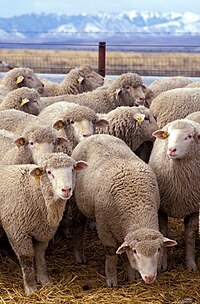
Photo from wikipedia
The North American bison has evolved to thrive on a diverse range of habitats and climate. As a ruminant, it is dependent on the metabolic activities of symbiotic microorganisms to… Click to show full abstract
The North American bison has evolved to thrive on a diverse range of habitats and climate. As a ruminant, it is dependent on the metabolic activities of symbiotic microorganisms to digest the plant fibers that make up the majority of its diet. To gain further insight into the bison rumen environment, which has remained largely unexplored, the primary objective of this study was to determine the diversity and composition of ruminal bacteria in bison fed a pasture-based diet. Ruminal content from 19 heifers maintained on pasture at the Standing Butte Ranch (North Stanley, South Dakota, USA) was collected by stomach tubing. Following extraction of microbial genomic DNA, PCR was performed to amplify the V1–V3 region of the 16S rRNA gene, then amplicons were sequenced using an Illumina MiSeq(2×300) platform. Next-generation sequence data was then analyzed using a combination of custom Perl scripts, publicly available software (Mothur v. 1.40) and online tools (RDP classifier and NCBI Blast). Bacteroidetes and Firmicutes were found to be the dominant phyla in the rumen environments analyzed, together representing 85.3% to 96.6% of sequence reads in individual samples. In contrast, the ratio of Bacteroidetes to Firmicutes showed a much broader range (0.57 to 3.90), suggesting that the rumen bacterial communities of the sampled animals exhibited a wide array of distinct composition patterns. However, Pearson correlation analysis did not support an association between the Shannon alpha diversity index and the abundance of either Bacteroidetes or Firmicutes (P > 0.05). Interestingly, Pearson correlation analysis supported a positive association between Bacteroidetes and Fibrobacteres (P < 0.05), as well as between Firmicutes and Planctomycetes (P < 0.05). Together, these results suggest that at least two rumen enterotypes, Bacteroidetes-Fibrobacteres and Firmicutes-Planctomycetes, can be distinguished in the rumen of North American bison heifers maintained on a pasture-based diet.
Journal Title: Journal of Animal Science
Year Published: 2019
Link to full text (if available)
Share on Social Media: Sign Up to like & get
recommendations!